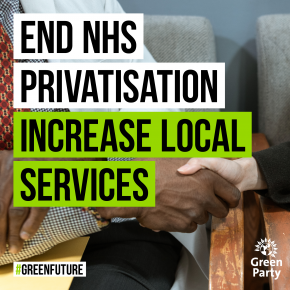The official website of the
North and West Oxfordshire
Local Party
of the
Green Party
of England and Wales
.
Serving members, supporters and citizens in the towns and villages around Cherwell and West Oxfordshire, including the following wards:
CHERWELL
- Adderbury, Bloxham and Bodicote
- Banbury Calthorpe and Easington
- Banbury Cross and Neithrop
- Banbury Grimsbury and Hightown
- Banbury Hardwick
- Banbury Ruscote
- Bicester East
- Bicester North and Caversfield
- Bicester South and Ambrosden
- Bicester West
- Cropredy, Sibfords and Wroxton
- Deddington
- Fringford and Heyfords
- Kidlington East
- Kidlington West
- Launton and Otmoor
WEST OXFORDSHIRE
Adderbury, Bloxham and
Alvescot and Filkins
- Ascott and Shipton
- Bampton and Clanfield
- Brize Norton and Shilton
- Burford
- Carterton North West
- Carterton South
- Chadlington and Churchill
- Charlbury and Finstock
- Chipping Norton
Ducklington
- Eynsham and Cassington
- Freeland and Hanborough
- Hailey, Minster Lovell and Leafield
- Kingham, Rollright and Enstone
- Milton under Wychwood
- North Leigh
- Standlake, Aston and Stanton Harcourt
- Stonesfield and Tackley
- The Bartons
- Witney Central
- Witney East
- Witney North
- Witney South
- Witney West
- Woodstock and Bladon
NOTE: Wards listed above in larger font have Green Councillors in 2025 local elections
---------------------
The search engine below will only search
the West Oxon Green Party Website.
Please note the first three or four results will be ads for other organisations. West Oxon Green Party earns no income from these ads, they are placed there by Google.,


SALTCROSS
West Oxfordshire's New Garden Village - an exemplar???
West Oxfordshire District Council officers did a good job in the orignal planning approval of the development of Saltcross just north of the A40 in Eynsham. However, the national plnning inspectorate has asked the Coouncil to remove many of the requirments that would make the development Net Zero and environmentally sound.
EPIC have stated that "It was deeply disappointing that the Planning Inspector decided to water down, and in crucial cases remove, those ambitions and standards, particularly those that were the basis of the AAP’s intention to address the climate and ecological emergencies. The provisions of Policy 2, Net Zero Carbon Development, were a key element in the AAP. Reducing these standards makes a mockery of the document’s climate change ambitions. What is worse, authorities around the country are watching the progress of these exemplary standards, so if they are lost at Salt Cross, it could have much wider implications."
As the Town and Country Planning Association has said: “It’s no exaggeration to say PINS [The Planning Inspectorate] has wrecked the overall net zero approach.”
The council has now developed a response to the inspectorate. The Council is consulting on the “Main Modifications” to the Salt Cross Garden Village Area Action Plan (AAP).
Note: Responses must be received by 4 November 2022.
The consultation document is time consuming to complete but the people at EPIC in Eynsham have taken the time to review all the documents and the council have advised that email responses will be taken into account. If you wish to see EPIC's advice it is here. https://eynsham.org.uk/org-news.aspx?nid=1885#news
If it helps here is the email response drafted and submitted by Cllr. Rosie Pearson.
File: ResponsetoSaltCrossconsultation.pdf
LOCAL POLICY STATEMENT ON HOUSING
The document below is based upon extracts from the Green Party Manifesto and The Oxfordshire Green Party Mini Manifesto) plus input from the West Oxfordshire Green Party Officers and activists. We welcome your input into this statement as a basis for our local policy development. Please forward your comments via our contact page
Solving the Housing Problem
In the Green Party, we believe that affordable, secure and comfortable accommodation is a basic human right. Those without accommodation, and those forced through lack of choice into inadequate or unaffordable housing, can end up leading diminished lives and can even be excluded from playing their full part in society.
The Government’s Proposed Planning Reforms should be opposed
We oppose the present Government’s proposed centralisation and standardisation of the planning system, which would take away many of the powers of local authorities and replace them with a one-size-fits-all approach to planning. In the past this has led to poor quality housing and excessive profiteering.
In the Green Party, we feel that it is essential for local authorities, led by local elected councillors, to retain the ability to influence planning and hence housing and land use developments. This is more likely to benefit the local communities and minimise any detrimental consequences.
The Problem
The inadequate and inequitable provision of housing in this country today is the result of inequalities in access to resources, particularly land, the inability of the free market to meet diverse housing needs, and a lack of investment in public housing. Government policy has encouraged the treatment of housing as a form of speculative investment, rather than a basic requirement for individual and social well-being.
Some areas of the UK suffer from severe housing shortages, while large quantities of housing lie empty in others. Under-occupation of housing sits side by side with overcrowding. Severe problems, such as rough sleeping, are highly concentrated in a minority of local authorities, for reasons broader than local housing policy. For these reasons, housing policy cannot meet local housing needs in isolation and must be fully integrated with other social, economic and environmental policies.
Much of our housing stock is very inefficient in terms of energy and water usage, making our homes a major source of greenhouse gas emissions contributing to the climate emergency. This also causes high levels of fuel poverty leading to physical and mental health problems. Improving the energy efficiency of all homes should be a priority. Building new houses that are anything less than carbon neutral will actually add to the climate crisis. Yet not one Council within Oxfordshire has written proper carbon neutrality (as defined by the UK Green Building Council) into their Local Plans.
We cannot achieve the health outcomes we need, or tackle the climate emergency, without addressing the poor quality of existing housing and its lack of affordability – to either own or rent.
- Properties in Oxfordshire had an overall average price of £411,066 over the last year.
- House prices are more than 10 times the typical County salary. In Oxford the situation is much worse.
- The average Oxfordshire rent is more than £1500 pcm – more than half gross average earnings. In other words, more than half of earnings are spent on rent.
- In the most deprived wards, more than 12% of residents suffer from fuel poverty.
Why the proposed solution is wrong
As part of the Government Proposed Planning Reforms, the recent Housing and Growth Deal is supporting the delivery of 100,000 homes across the County. The funding for this deal was awarded to the County primarily to allow its economy to continue to grow (it has grown by 3.9% per year since 2006) and increase the £23bn it delivers to the UK Treasury each year. Unfortunately, the rate of growth of the County’s economy has been faster than it has been possible to build houses. Resulting in the requirement for housing outstripping the supply, making houses even less affordable. The lack of housing is seen as a barrier to achieving the growth targets set by the Government and the Oxfordshire Growth Board.
Whilst it might seem initially sensible to try and build our way out of the problem, it ignores the changes that have happened in the economy, the environment and in public health. Priorities have to change. Far from solving the County’s housing or climate problem, the Housing and the Growth Deal is actually making things worse.
Most of the plans for developments around West Oxfordshire are based upon the projected housing “needs” resulting from perceived and planned growth of the economy in the City of Oxford and the Oxford Cambridge Arc[1]. Rather than addressing the needs and wishes of current West Oxfordshire residents[2], the region is being seen as an engine for driving UK economic growth. The majority of housing planned for the district (around Eynsham for instance) is explicitly intended to meet demand for housing within Oxford: in other words, it is designed for people working in Oxford who will have to commute. These plans were developed before the county and the district councils declared a climate change emergency and much of the baseline work was done before Brexit was even on the horizon.
Since then the impact of the COVID-19 pandemic has shown us that there is another way to work, and that commuting in and out of Oxford is not necessary for a large proportion of the workforce. The growth of remote working opens up the prospect of employees living in much more distant locations, where housing is not under so much pressure as it is in and around Oxfordshire.
A Better Way Forward
So much has changed that we feel that it is important that the local development plans and targets are thoroughly reviewed to ensure that they meet the needs of residents (not developers) and are designed around a healthy, sustainable, decarbonised economy.
Principles
The Green Party recognises a universal human right to shelter that is affordable, secure and to a standard adequate for the health and well-being of the household.
This right should be met by a balanced mix of tenures and providers, varying according to people’s circumstances and preferences.
Housing policy should be fully integrated with other policies to build more sustainable, self-reliant communities. The provision of housing should be coordinated with developments to provide work, leisure, education, transport and health care.
Aims
- To ensure everyone is provided with housing, appropriate to their needs, that is affordable, secure and comfortable.
- To minimise the impact of housing on other species and the natural environment, including flooding.
- To give local communities a stronger voice in local housing policy.
- To break the stranglehold that a small number of large developers have over housing provision.
- To review and challenge housing allocations to reduce numbers, minimise green field building and ensure that new housing is better matched to the needs of existing residents.
West Oxfordshire Green Party Policy is to:
- Challenge housing allocations that are not based upon sustainable growth targets.
- Oppose development on the Green belt and Flood Plains.
- Prioritise building of social housing in partnership with Community Land Trusts and others.
- Oppose developments that have inadequate provisions for infrastructure and local services (adequate extra supply and wastewater handling capacity should be in place before developments start)
- Expect that housing matched to the needs of existing local citizens is a priority for developers.
- Expect all new buildings to be highly eco-friendly, energy efficient and well insulated to standards such as those set by the Passivhaus Trust[3].[4]
- Encourage developers to partner with other groups, where possible, for key worker part rent / part buy schemes within safe cycling distance of work-places and job opportunities.
- Support the re-introduction of rent controls by national Government
Further Information
The Green Party of England and Wales has an extensive array of policies covering housing in its manifesto.
The Oxfordshire Green Party Manifesto focusses on building homes without losing the countryside. Affordable homes in built-up areas near job opportunities and the facilities that people need, makes more sense than developing new greenfield sites with little or no infrastructure.
West Oxfordshire District Council’s Housing Land Supply Position Statement of October 2019 indicates where the 4,500 new homes are proposed to be built in the District in the near future.
[1] Oxford Cambridge Arc is a central Government concept, based upon using this region as an engine for UK economic growth and allowing landowners and developers to cash in. The plans are not based around meeting the needs or wishes of current residents and would inevitably make “levelling up” around the country much more difficult to achieve.
[2] Letter re Housing Needs from K Jennison, published in Witney Gazette
[3] Passivhaus/Green party document - Passivhaus Standards for New Houses
[4] West Oxon Green Party Green Homes web page and briefing pack












